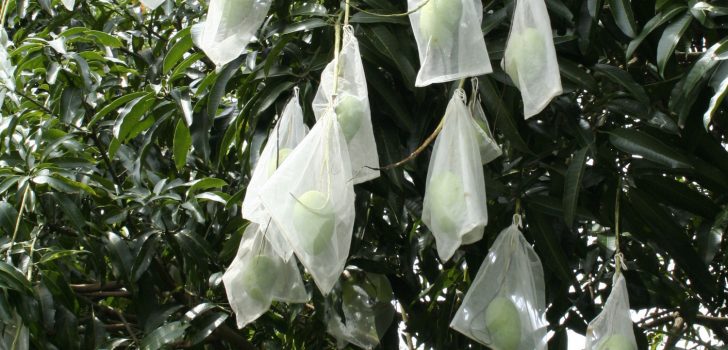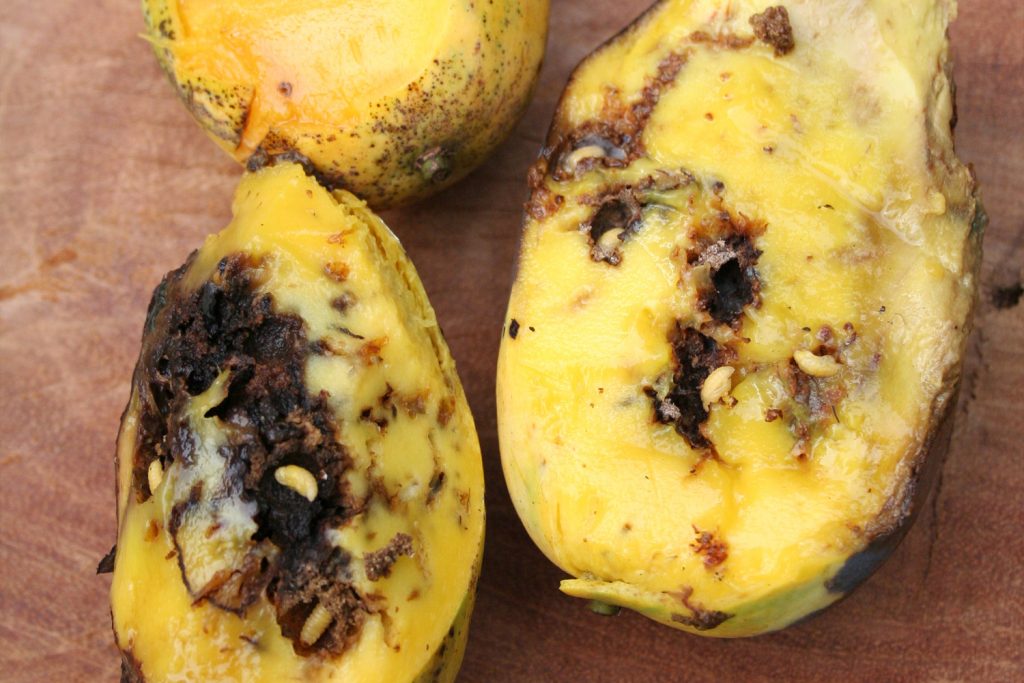 The fresh mangoes in Puerto Princesa City are wrapped in transparent nets to protect them from being infected by mango pulp weevils. (Photo by Elmo Morillo, DA-PRDP RPCO 4B InfoACE Unit)
The fresh mangoes in Puerto Princesa City are wrapped in transparent nets to protect them from being infected by mango pulp weevils. (Photo by Elmo Morillo, DA-PRDP RPCO 4B InfoACE Unit)
PRDP-funded processing center in Puerto Princesa prioritizes mango growers
The Philippine Rural Development Project (PRDP) has recently endorsed the construction of a processing center for the mango growers in Puerto Princesa City, Palawan.
The P17.93 million-worth “Mango Processing Facility and Marketing” subproject will cater additional income for the member-beneficiaries of the Tagumpay Agrarian Auto-Savings Multi-Purpose Cooperative or TAAS-MPC. The proponent group, with 382 members, aims to address the core problem of mango growers in Palawan—the mango pulp weevil.
“Ang sarap ng mangga sa Puerto Princesa, matamis. Ang problema, hindi natin mailabas, hindi natin maipagmalaki dahil may quarantine (The mangoes of Puerto Princesa are delicious, sweet. The problem is we can’t export it, we can’t be proud of it because of the quarantine),” Puerto Princesa City Mayor Luis Marcaida III said during one of the recent activities of PRDP MIMAROPA.
Palawan is the only province in the Philippines to have an implemented confinement over its mango produce, because of the mango pulp weevil.
The mango pulp weevil, sometimes referred to as the MPW, is a small insect infecting mango fruits. This insect was first discovered in Southern Palawan and soon extended to Puerto Princesa City. Although the northern part of the island province is unaffected, in 1987, the Bureau of Plant Industry placed a quarantine to avoid the spread of the pest to other parts of the country.

Mango fruits, when infected by mango pulp weevils, become damaged and are destroyed on the inside. The pest makes it inedible, a waste, and a loss of income for mango growers. (Photo by Elmo Morillo, DA-PRDP RPCO 4B InfoACE Unit)
These turn of events adversely affected the agricultural economy of Palawan, mostly the development of its mango industry. For three decades, it has been suffering from a restricted trading after losing the opportunity to market fresh mangoes locally and even internationally.
Through the special project of the Department of Agriculture, the city government made it a priority to provide their mango growers a new chance to have an additional livelihood.
By utilizing the oversupply of fresh mangoes, the subproject can raise the actual farm productivity of its farmer-beneficiaries. The price of mango will increase, because of the value adding activity, and at the same time, the processing center will be able to generate employment opportunities for other members of the community.
“While there is a ban because of the mango pulp weevil in the export of fresh mango out of Palawan, there is no ban in the by-products that can be derived out of the fresh mango,” explained Mayor Marcaida.
Aside from its members, the TAAS-MPC will also acquire fresh mangoes from growers in neighboring barangays. There is an average of 600 individual growers who will supply the cooperative particularly during the peak season.
The TAAS-MPC will distribute dried mango and mango nectar to its institutional buyers and clientele, which mainly consist of pasalubong centers, souvenir shops, and retailers whose main customers are the tourists visiting the city and province in general.
In addition to the processing center, Mayor Marcaida also recognized the PRDP-funded Bukang Liwayway to Makandring farm-to-market road which is almost at the completion stage.
Aside from fresh mangoes, the city is also abundant in cashew nuts. The infrastructure subproject, located in one of the largest cashew plantation in the city, hopes to reduce transport losses and other production hindrances to cashew growers. ### (Leira Vic Colongon, DA-PRDP RPCO 4B InfoACE Unit)
